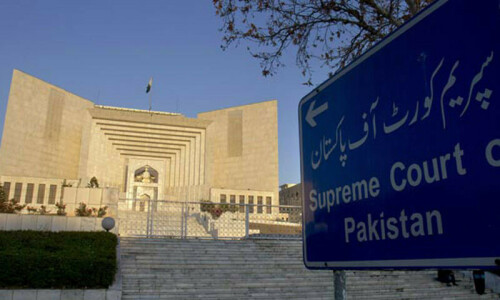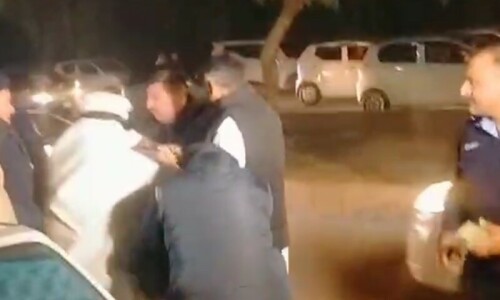KARACHI, Jan 10: A little more than six years ago, immediately after the Sept 11 terrorist attacks in the US, few sane investment advisers would have recommended Pakistani stocks.
They should have. Their clients could have made a fortune.
Since 2001, the nuclear-armed country has been making millionaires like newly minted coins.As Western governments have fretted about Pakistan’s nuclear weapons falling into ‘wrong hands’, the Karachi Stock Exchange’s main share index has risen more than 10-fold.
And it is not just that Karachi is a thinly traded market, able to be dragged skyward at time by speculators. Profits have taken off as well.
Even last month’s assassination of PPP leader Benazir Bhutto, and the brief but terrifying spate of violence it unleashed, failed to make much more than a dent in the market.
Businessmen are more worried than brokers, but all agree it will take more than Ms Bhutto’s death to destroy this boom, which has been based on open-door investment policies and privatisation.
“It’s sad, and it does affect the business, but I guess it’s been happening for so long that people just get used to it,” shrugged Omer Sabir, who sells luxury sports cars from upwards of $100,000 each at Karachi’s only Porsche dealer.
Home to 14 million people, Pakistan’s biggest city is booming.
The city has seen property prices soar and shopping malls sprout up.
Foreign banks such as Standard Chartered and ABN Amro have bought up local banks. Just this month Bank Muscat and Japan’s Nomura Holdings agreed to a $200 million takeover of Saudi Pak Bank.
Barclays is also looking to build a local business.
Even during frequent power blackouts, local bankers can see by the light of their generators that profits are good, among the strongest bank returns in the world, says Invisor Securities.
At Karachi’s underground night-club scene – literally, underground – sons and daughters of the upper middle-class drink in glittering semi-darkness and listen to DJs play the latest beats.
TIME TO SELL?
But right now, the party might be coming to an end.
The stock market is still trading just 3 per cent below its highest closing mark (14,814.85 points), but the outlook is far less certain than six years ago, when President Pervez Musharraf began his reforms, spurring local and foreign investment.The economy, which averaged around 7 per cent annual growth in the five years to June 2007, is slowing and inflation is rising. Foreign investment and the farm sector, two important drivers of Pakistan’s economic success story, have also moved down a gear.
The street is also getting angry.
For many Pakistanis, the boom has been mainly a spectator sport. They can see the new shopping malls but cannot afford to buy anything there. About a quarter of them still live in poverty, earning around Rs1,000 rupees a month, though the proportion has been falling, according to 2006 government data.A few blocks away from the Porsche dealership, men and women queue in vain for hours to buy a bag of flour at a government store. Power blackouts make the winter bleaker still.
So if these Pakistanis find their voice in elections scheduled for Feb 18, will there be changes in store for broad economic policy and the rich crust of Pakistan society?
The answer from businessmen, political analysts and economists seems to be a unanimous but rather hopeful “no”.
Religious parties, and their campaigns against Western decadence and corruption, appeal strongly to the poor, but recent polling suggests the mainstream parties will dominate the next government, assuming the Feb 18 elections are free and fair.
The PPP, Pakistan’s biggest, has been campaigning under the slogan ‘Food, shelter, clothing’ and still plans to contest the elections, but political analysts do not expect it to usher in a state-driven economy if it wins power.
“The overall direction of the Pakistan economy would be the same,” said political analyst Hasan Askari Rizvi. — Reuters














































Dear visitor, the comments section is undergoing an overhaul and will return soon.